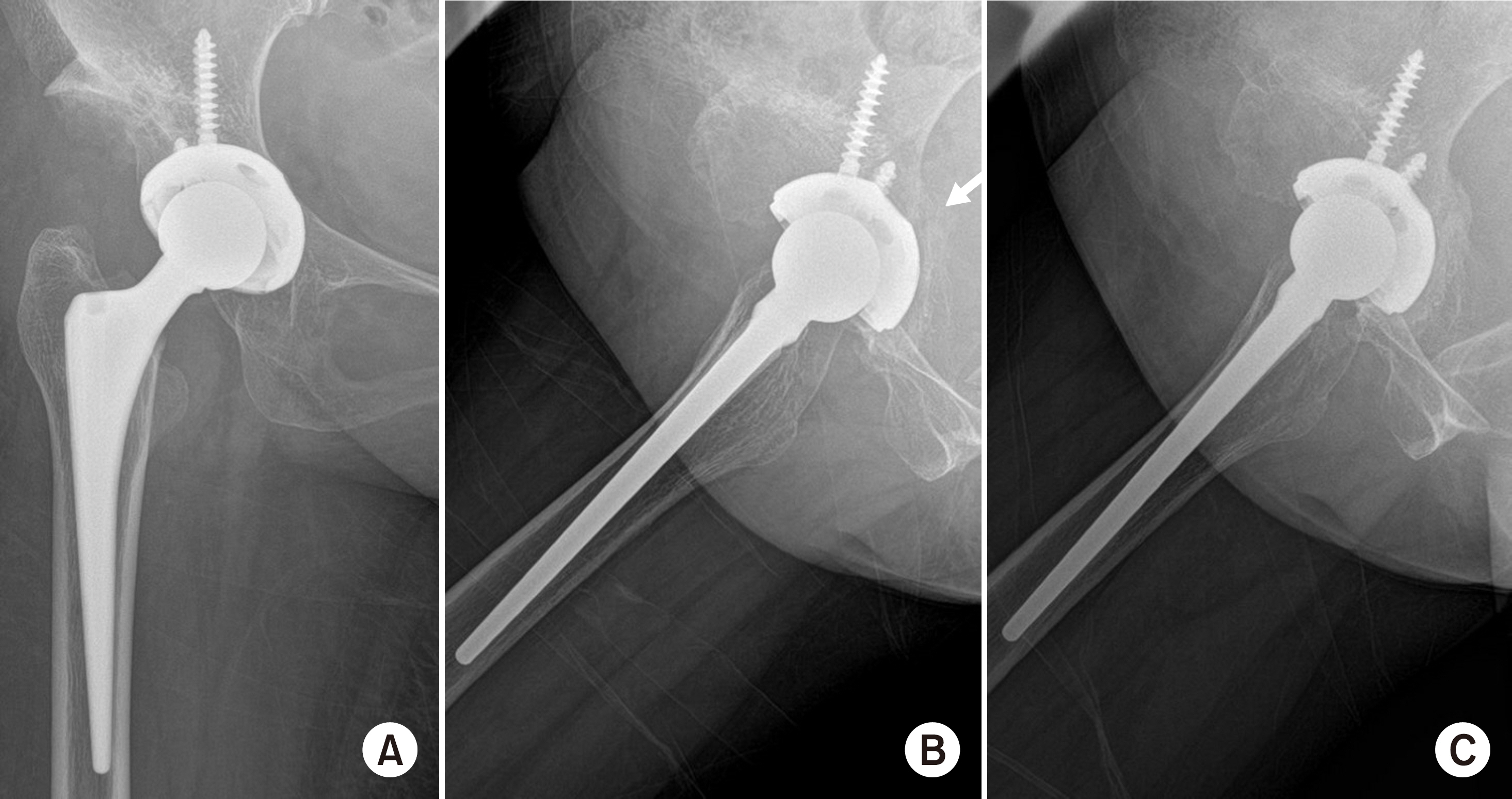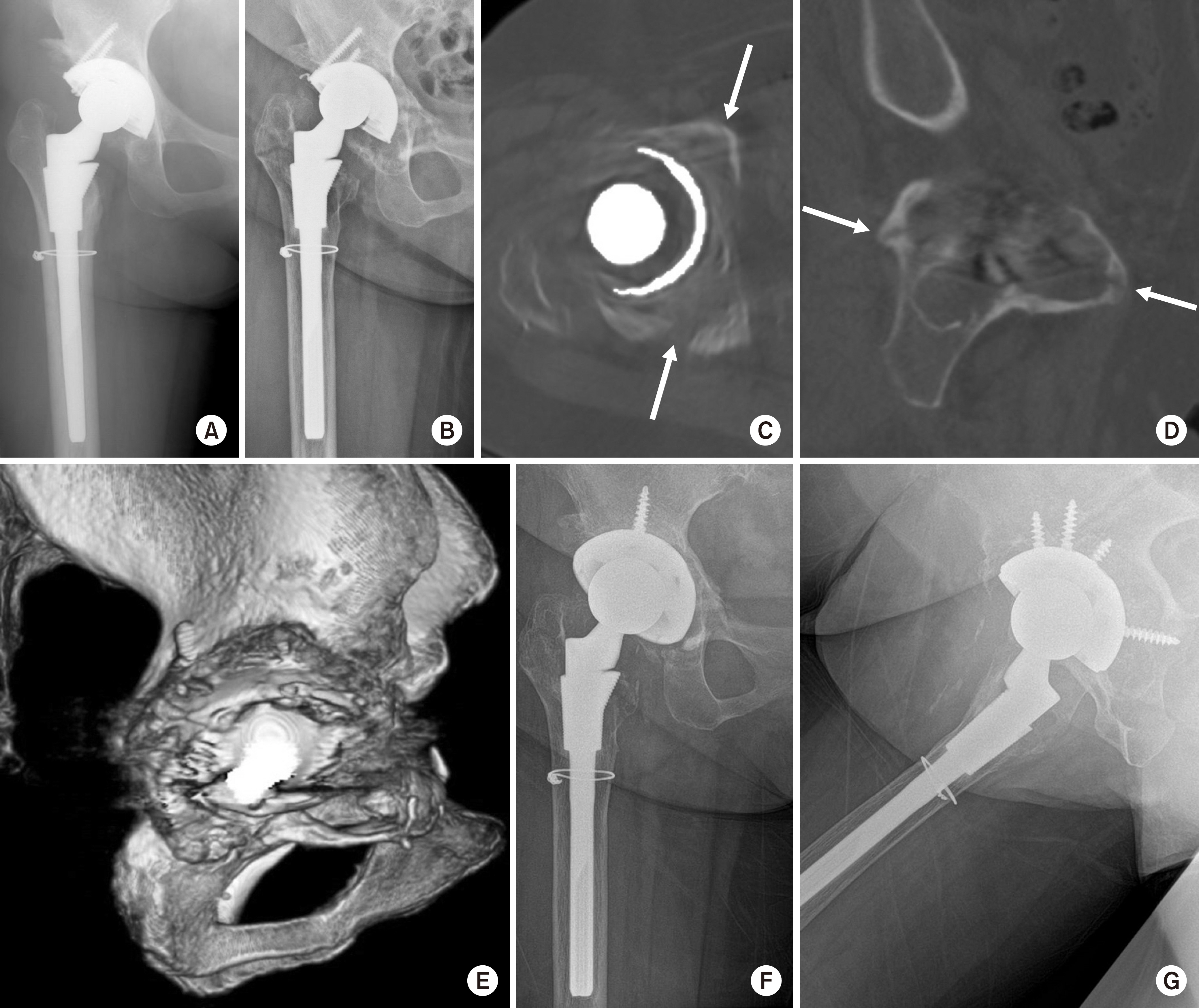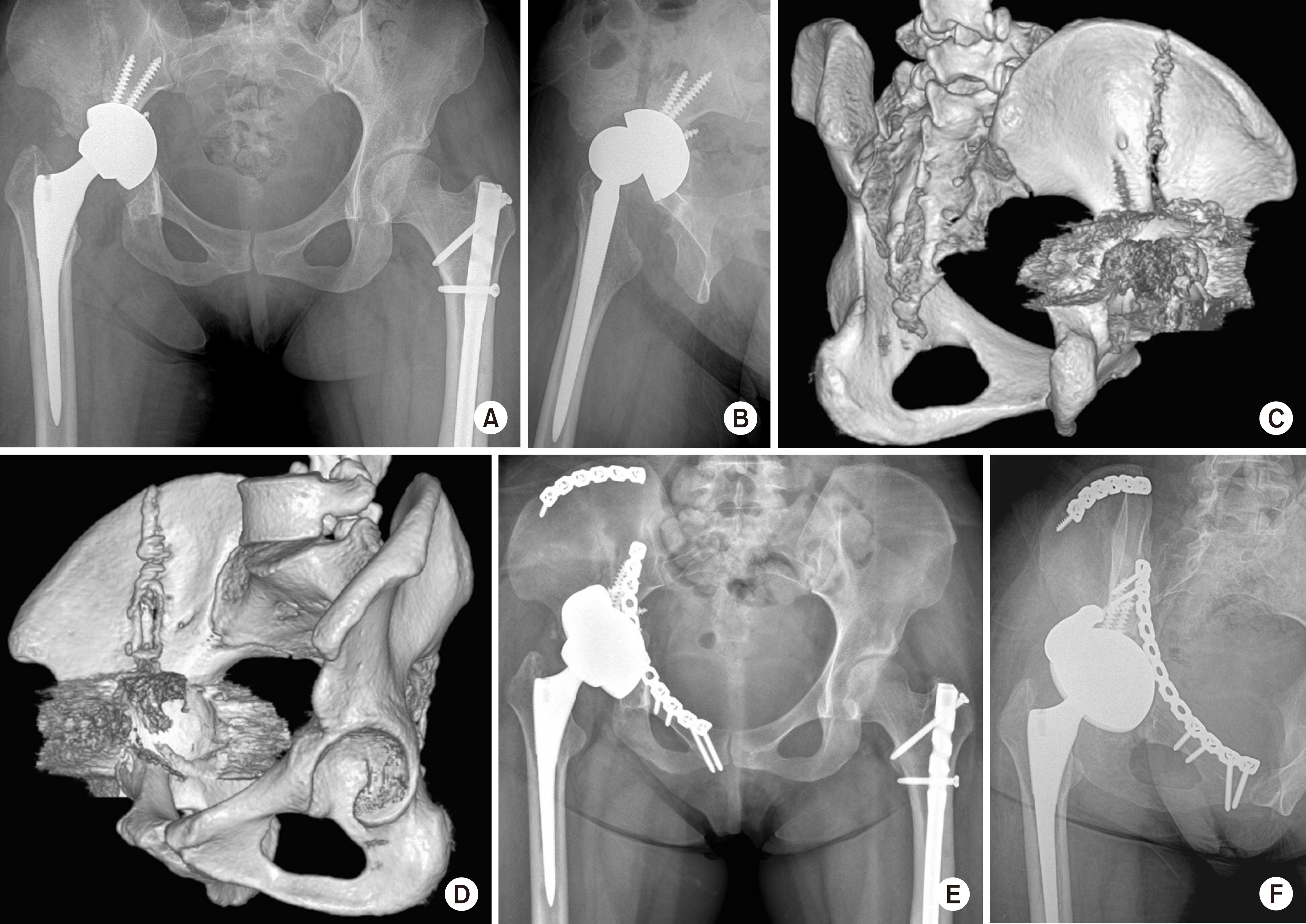J Korean Fract Soc.
2019 Jul;32(3):148-156. 10.12671/jkfs.2019.32.3.148.
Principles for Management of Periprosthetic Acetabular Fractures after Hip Arthroplasty
- Affiliations
-
- 1Department of Orthopedic Surgery, Samsung Medical Center, Seoul, Korea. limsj70@gmail.com
- 2Department of Orthopedic Surgery, Inje University Ilsan Paik Hospital, Goyang, Korea.
- 3Department of Orthopedic Surgery, Gangnam Severance Hospital, Seoul, Korea.
- KMID: 2453068
- DOI: http://doi.org/10.12671/jkfs.2019.32.3.148
Abstract
- Periprosthetic acetabular fracture (PAF) is an uncommon complication following hip arthroplasty. However, as the number of people needing hip prostheses continues to rise, the absolute number of PAF is expected to increase as well. These fractures may occur either intraoperatively or postoperatively. Postoperative fractures can be caused by traumatic events or by pathologic conditions related to periacetabular osteolysis. The management of PAF usually depends on the degree of displacement and the stability of the acetabular component. While most of non-displaced fractures can be managed nonoperatively by protected weight bearing, displaced fractures with unstable implants require surgical intervention, which is often technically challenging. This review summarized the latest findings on the epidemiology, the diagnosis, the classification, and the treatment of PAF.
MeSH Terms
Figure
Cited by 1 articles
-
Treatment of Periprosthetic Femoral Fractures after Hip Arthroplasty
Jung-Hoon Choi, Jong-Hyuk Jeon, Kyung-Jae Lee
J Korean Fract Soc. 2020;33(1):43-51. doi: 10.12671/jkfs.2020.33.1.43.
Reference
-
References
1. Davidson D, Pike J, Garbuz D, Duncan CP, Masri BA. Intraoperative periprosthetic fractures during total hip arthroplasty. Evaluation and management. J Bone Joint Surg Am. 90:2000–2012. 2008.2. Simon P, von Roth P, Perka C. Treatment algorithm of acetabular periprosthetic fractures. Int Orthop. 39:1995–2003. 2015.
Article3. Helfet DL, Ali A. Periprosthetic fractures of the acetabulum. Instr Course Lect. 53:93–98. 2004.4. Kim YS, Callaghan JJ, Ahn PB, Brown TD. Fracture of the acetabulum during insertion of an oversized hemispherical component. J Bone Joint Surg Am. 77:111–117. 1995.
Article5. Sharkey PF, Hozack WJ, Callaghan JJ, et al. Acetabular fracture associated with cementless acetabular component insertion: a report of 13 cases. J Arthroplasty. 14:426–431. 1999.6. Curtis MJ, Jinnah RH, Wilson VD, Hungerford DS. The initial stability of uncemented acetabular components. J Bone Joint Surg Br. 74:372–376. 1992.
Article7. Haidukewych GJ, Jacofsky DJ, Hanssen AD, Lewallen DG. Intraoperative fractures of the acetabulum during primary total hip arthroplasty. J Bone Joint Surg Am. 88:1952–1956. 2006.
Article8. Chatoo M, Parfitt J, Pearse MF. Periprosthetic acetabular fracture associated with extensive osteolysis. J Arthroplasty. 13:843–845. 1998.
Article9. Chitre A, Wynn Jones H, Shah N, Clayson A. Complications of total hip arthroplasty: periprosthetic fractures of the acetabulum. Curr Rev Musculoskelet Med. 6:357–363. 2013.
Article10. Benazzo F, Formagnana M, Bargagliotti M, Perticarini L. Periprosthetic acetabular fractures. Int Orthop. 39:1959–1963. 2015.
Article11. Miller AJ. Late fracture of the acetabulum after total hip replacement. J Bone Joint Surg Br. 54:600–606. 1972.12. McElfresh EC, Coventry MB. Femoral and pelvic fractures after total hip arthroplasty. J Bone Joint Surg Am. 56:483–492. 1974.
Article13. Peterson CA, Lewallen DG. Periprosthetic fracture of the acetabulum after total hip arthroplasty. J Bone Joint Surg Am. 78:1206–1213. 1996.
Article14. Takigami I, Ito Y, Mizoguchi T, Shimizu K. Pelvic discontinuity caused by acetabular overreaming during primary total hip arthroplasty. Case Rep Orthop. 2011:939202. 2011.
Article15. Della Valle CJ, Momberger NG, Paprosky WG. Periprosthetic fractures of the acetabulum associated with a total hip arthroplasty. Instr Course Lect. 52:281–290. 2003.16. Berry DJ, Lewallen DG, Hanssen AD, Cabanela ME. Pelvic discontinuity in revision total hip arthroplasty. J Bone Joint Surg Am. 81:1692–1702. 1999.
Article17. Zwartelé RE, Witjes S, Doets HC, Stijnen T, Pöll RG. Cementless total hip arthroplasty in rheumatoid arthritis: a systematic review of the literature. Arch Orthop Trauma Surg. 132:535–546. 2012.
Article18. McGrory BJ. Periprosthetic fracture of the acetabulum during total hip arthroplasty in a patient with Paget's disease. Am J Orthop (Belle Mead NJ). 28:248–250. 1999.19. Desai G, Ries MD. Early postoperative acetabular discontinuity after total hip arthroplasty. J Arthroplasty. 26:1570.e17–e19. 2011.
Article20. Martin JR, Barrett IJ, Sierra RJ, Lewallen DG, Berry DJ. Preoperative radiographic evaluation of patients with pelvic discontinuity. J Arthroplasty. 31:1053–1056. 2016.
Article21. Goodman SB, Adler SJ, Fyhrie DP, Schurman DJ. The acetabular teardrop and its relevance to acetabular migration. Clin Orthop Relat Res. 236:199–204. 1988.
Article22. Onsten I, Carlsson AS, Ohlin A, Nilsson JA. Migration of acetabular components, inserted with and without cement, in one-stage bilateral hip arthroplasty. A controlled, randomized study using roentgenstereophotogrammetric analysis. J Bone Joint Surg Am. 76:185–194. 1994.
Article23. Udomkiat P, Wan Z, Dorr LD. Comparison of preoperative radiographs and intraoperative findings of fixation of hemispheric porous-coated sockets. J Bone Joint Surg Am. 83:1865–1870. 2001.
Article24. Fehring KA, Howe BM, Martin JR, Taunton MJ, Berry DJ. Preoperative evaluation for pelvic discontinuity using a new reformatted computed tomography scan protocol. J Arthroplasty. 31:2247–2251. 2016.
Article25. Gelalis ID, Politis AN, Arnaoutoglou CM, Georgakopoulos N, Mitsiou D, Xenakis TA. Traumatic periprosthetic acetabular fracture treated by acute one-stage revision arthroplasty. A case report and review of the literature. Injury. 41:421–424. 2010.
Article27. Callaghan JJ, Kim YS, Pederson DR, Brown TD. Periprosthetic fractures of the acetabulum. Orthop Clin North Am. 30:221–234. 1999.
Article28. Duncan CP, Haddad FS. The Unified Classification System (UCS): improving our understanding of periprosthetic fractures. Bone Joint J. 96:713–716. 2014.29. Pascarella R, Sangiovanni P, Cerbasi S, et al. Periprosthetic acetabular fractures: a new classification proposal. Injury. 49(Suppl 3):S65–S73. 2018.
Article30. Ko PS, Chan WF, Wong MK, Leung MF, Lee OB, Lam JJ. Fixation using acetabular reconstruction cage and cancellous allografts for intraoperative acetabular fractures associated with cementless acetabular component insertion. J Arthroplasty. 19:643–646. 2004.
Article31. Springer BD, Berry DJ, Cabanela ME, Hanssen AD, Lewallen DG. Early postoperative transverse pelvic fracture: a new complication related to revision arthroplasty with an uncemented cup. J Bone Joint Surg Am. 87:2626–2631. 2005.32. Whaley AL, Berry DJ, Harmsen WS. Extra-large uncemented hemispherical acetabular components for revision total hip arthroplasty. J Bone Joint Surg Am. 83:1352–1357. 2001.
Article33. Paprosky W, Sporer S, O'Rourke MR. The treatment of pelvic discontinuity with acetabular cages. Clin Orthop Relat Res. 453:183–187. 2006.
Article34. Rogers BA, Whittingham-Jones PM, Mitchell PA, Safir OA, Bircher MD, Gross AE. The reconstruction of periprosthetic pelvic discontinuity. J Arthroplasty. 27:1499–1506. .e1,. 2012.
Article
- Full Text Links
- Actions
-
Cited
- CITED
-
- Close
- Share
- Similar articles
-
- Treatment of Periprosthetic Femoral Fractures after Hip Arthroplasty
- Periprosthetic Femoral Fractures after Hip Arthroplasty
- Decision-Making and Principle of Management in Periprosthetic Femoral Fracture after Total Hip Arthroplasty
- A Case of Periprosthetic Fracture of Acetabulum Associated with Osteolysis
- Periprosthetic Atypical Femoral Fracture-like Fracture after Hip Arthroplasty: A Report of Three Cases






